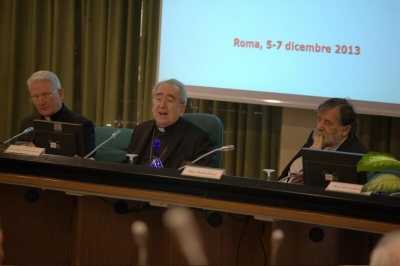The choice of the theme “Proclaiming Christ in the digital age” for the 26th Plenary Assembly of the Pontifical Council for the Laity comes from the realisation that the world of digital communication has profoundly changed the landscape of the cultural and social life of our planet in a very short time.
The sessions began with an opening address by Cardinal Stanislaw Rylko. He quoted recent popes in saying that cyberspace is “a new frontier opening up at the beginning of this new millennium. Like the new frontiers of other times, this one too is full of the interplay of danger and promise [...]. For the Church the new world of cyberspace is a summons to the great adventure of using its potential to proclaim the Gospel message [...] especially among the young who increasingly turn to the world of cyberspace as a window on the world”.
Cardinal Rylko went on to say that the programme of the assembly was decided in such a way as to avoid taking the two extreme approaches that dominate today’s cultural debate on the issue. On the one hand there is a tendency to demonise the network and to see only threats and dangers. On the other hand, there is an attitude of unconditional approval that sees only benefits in new technologies and in the new languages. It is almost as if they alone can guarantee a bright future for humanity. Both positions are usually presented with the support of publications, studies and research, but where is the truth? The certain fact that emerges from the magisterium is that a Christian cannot avoid the challenge of dealing with the new ways brought about by innovations in communications.
The morning session continued with a talk by Professor Mario Pollo. He pointed out that the advent of the digital culture has changed several paradigms of space and time in which human beings are accustomed to live. Space/time has become space/speed, a crisis in the concept of time has diminished the capacity to plan ahead, and deterritorialisation has challenged traditional communities and has created new ones focused on destiny or on feelings.
The afternoon session began with a presentation by Professor Tonino Cantelmi. He said that it is becoming evident that the advent of digital technologies is generating psycho-cognitive mutations that are actually laying the foundations for a new anthropology. Professor Cantelmi insisted on the need to become aware that this is a phenomenon of tremendous potential. For this reason it must be properly governed by those who are part of what will be the last pre-digital generation.
In the concluding talk of the first day of the Plenary, Father Antonio Spadaro spoke of the real nature of internet experiences. He quoted Benedict XVI in saying: “The digital environment is not a parallel or purely virtual world, but is part of the daily experience of many people, especially the young”. For this reason, as long as we say that we must stop relating via the internet in order to have real live relationships, then we are confirming our generation’s schizophrenia regarding the internet. We experience the digital environment as a purely recreational environment in which we put a second self. We have a double identity that lives on ephemeral trivialities. It is like a bubble devoid of physical realism and real contact with the world and with others.


